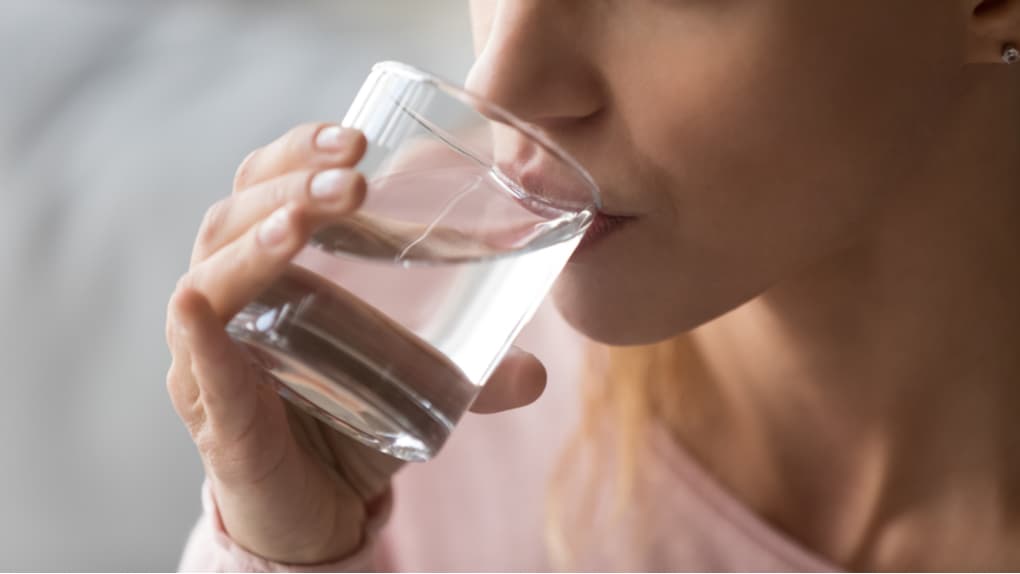Drink More Water for Your Health and Weight

If you think you’re doing your body a favor by drinking a diet soda rather than its sugar-loaded version, think again.
It turns out artificially sweetened soft drinks may be just as lethal as the sugar-sweetened variety. A September 2019 study examined over 450,000 people from ten European countries. It turns out that while sugary soft drinks have long been associated with greater risk of death, so are artificially sweetened soft drinks.
So, if you’re going to hydrate, there’s one sure bet: make it water.
Why Drink Water?
We are water. Literally. That’s because the body is made up of about 60 percent water. And keeping a balance of body fluids is vital as it makes our “engine” run properly and efficiently. Yet the majority of us—75 percent of Americans–don’t drink enough water.
Everything in our body runs on water. Hydration is important for tissues, and also helps cushion and brain and spinal cord. It works to maintain proper body temperature and blood pressure, and transports nutrients.
The health benefits of water are numerous. Here are a few of the specific benefits of drinking water.
Controls appetite
While water is not a magic weight loss tool, it can help fill you up as well as increase your metabolism. Certainly, drinking water instead of caloric beverages can be helpful. Drinking a glass of water a half hour before meals, “preloading” in a sense, can help you feel more full.
What’s more, the brain’s thirst mechanism is so weak that it is often mistaken for hunger. That midnight snack you’re craving might actually be a midnight sip. If you feel like raiding the fridge or the pantry, try the faucet instead and see if your urge to eat disappears.
Combats fatigue
Fatigue is a sign of dehydration. In fact, it turns out that people who seek treatment for fatigue are often dehydrated. The reverse may be true as well. Short on sleep? That can actually make you more than tired—it can also dehydrate you, according to a 2019 study published in Sleep. So, drinking water may help your fatigue, and getting enough sleep may help prevent dehydration.
Lubricates joints
Joints are composed of cartilage, which is made up of about 80 percent water. Drinking water helps that cartilage to do its job. In fact, long-term dehydration can lead to joint pain, due to the reduction in the joints’ ability to absorb shock.
Helps the bowels
Water helps soften stools and stimulate bowel movements. In fact, constipation is the result of dehydration because with insufficient fluids, the colon instead extracts the water from the stools. That is what causes constipation.
Prevents kidney stones
Kidneys serve to cleanse and rid the body of toxins. Water is vital for the kidneys to do that job. Water helps remove waste products, which the kidneys do by filtering about 30 to 40 gallons of fluid every day. Among its benefit for the kidneys, consuming sufficient water dilutes the minerals that cause stones.
Water Tips
It’s helpful to create and maintain a strategy for good hydration. You can do that with these water-drinking tips.
Choose water. Whether it’s at the gym or with meals, skip the soda, juice and other caloric options in favor of water.
Bring it with you. Carry water bottles for easy access, and also plant them, or a refillable water glass, at your desk or other commonly used locations.
Flavor or freeze. Freeze some water bottles to drink cold when thawed. To jazz up plain water, try flavoring it with a squeeze of lemon or lime, or some mint, or infuse water with fruit or cucumbers.
Eat watery foods. Approximately 20 percent of daily fluid intake comes from our food. Think fruit and vegetables. Did you know a banana is 75 percent water and that broccoli is 90 percent water? Even a serving of oatmeal or beans has about a half cup of water.
Sip, don’t gulp. Try not to chug down water in large amounts, as it is not as well absorbed. Drinking large amounts at once causes the kidneys to simply expel the water, resulting in frequent trips to the bathroom and is a possible risk for hyponatremia (see below). Sipping water enables the body to more efficiently absorb in, which is indicated by fewer trips to the bathroom.
Know Your Water Needs
It would seem simple: the body will tell you when you need fluids; drink when you’re thirsty. But by the time you get thirsty, you are probably already on the way to being dehydrated, having lost from one to two percent of your body’s water content.
From exercise to medications that require water consumption, it is important to understand your water needs. While the hard-and-fast rule has been established as “eight glasses a day” (referred to as 8 x 8=eight eight-ounce glasses), that one-size-fits-all is not true for everyone. For general guidelines on your needs, check out a water intake calculator.
A variety of customized apps can also help with hydration. They feature reminders to drink water and keep track of what you’ve consumed, and can match your water needs based on your personal use.
Keeping track of your water intake is important for many reasons. However, in all of this discussion of drinking more, it is also important to understand there is too much of a good thing, and that you can also overhydrate. That phenomenon is called hyponatremia, or water intoxication, which can lead to some serious consequences.
So, raise a glass of water, and drink to your health!
If you’d like to get healthy, request an appointment at Advanced Laparoscopic Associates. Our bariatric surgery experts and our nutrition team can help you come up with a plan to control your weight and cut your risk of disease.

